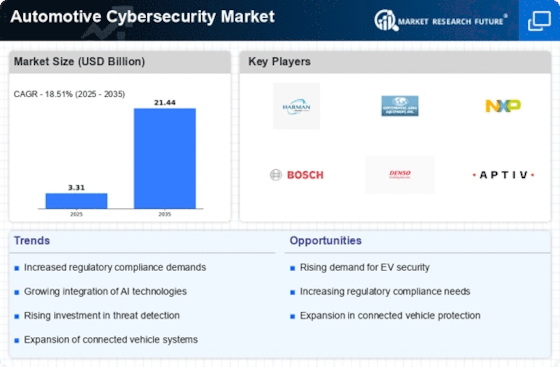Top Industry Leaders in the Automotive Cyber Security Market
*Disclaimer: List of key companies in no particular order
The global automotive cyber security market is undergoing swift expansion, fueled by the increased digitalization in vehicles, rising adoption of connected cars, and a growing awareness of cyber threats. This burgeoning sector is characterized by a competitive landscape, where established players and emerging startups contend for a piece of the market share.Key Players and Strategies:A spectrum of players is shaping this competitive arena:- Traditional Automotive OEMs (Original Equipment Manufacturers): Companies like Toyota, Volkswagen, and General Motors invest actively in cyber security solutions. Their strategies encompass in-house capability building, partnerships with cyber security specialists, and relevant company acquisitions.- Tier 1 Automotive Suppliers: Entities like Bosch, Continental, and Denso focus on developing diverse cyber security solutions, including intrusion detection systems, secure boot, and communication protocols. They cater to both OEMs and offer aftermarket upgrades for existing vehicles.- Cyber Security Specialists: Companies like Argus Cyber Security, ESCRYPT, and NXP Semiconductors specialize in tailored cyber security solutions for the automotive industry, focusing on aspects like vulnerability assessment, threat intelligence, and secure hardware.- Startups: Various startups enter the market with innovative solutions, addressing evolving threats in specific areas such as secure data management, blockchain-based security, and AI-powered threat detection.Factors for Market Share Analysis:Several factors influence market share in this competitive landscape:- Product Portfolio: Companies offering comprehensive solutions covering various automotive security aspects tend to hold a competitive edge.- Geographic Reach: A strong presence in key automotive markets like North America, Europe, and Asia enables dominance on a global scale.- R&D Investment: Continuous investment in research and development keeps companies ahead in the ever-evolving cyber threat landscape.- Partnerships and Collaborations: Strategic alliances with OEMs, tier 1 suppliers, and industry players enhance market reach and credibility.New and Emerging Trends:The automotive cyber security market is witnessing emerging trends:- Connected Car Security Focus: As connected cars increase, securing vehicle-to-cloud communication and data exchange becomes crucial, leading to solutions for secure data transmission, authentication protocols, and access control.- AI-Powered Threat Detection: Increasing use of artificial intelligence and machine learning to detect and respond to real-time cyberattacks.- Blockchain for Secure Data Management: Exploration of blockchain-based solutions for secure key and identity management within vehicles and connected car ecosystems.- Cybersecurity as a Service (CSaaS): Subscription-based cyber security solutions providing advanced features without hefty upfront investments.Expectations suggest continued high competition. Established players expand their portfolios while new entrants offer innovative solutions, creating a diverse landscape. Specialization in specific security areas is rising, enhancing expertise in addressing particular security challenges. Collaboration remains pivotal for developing comprehensive security solutions.Future Prospects:The automotive cyber security market foresees significant growth. Companies adaptable to evolving landscapes, investing in cutting-edge tech, and effective collaboration are poised for success in this dynamic and competitive domain.Industry Developments and Latest Updates:- NXP Semiconductors N.V. (Netherlands): Collaborated with Ford to deliver secure over-the-air updates for enhanced driver convenience and experience.- Argus Cyber Security (Israel): Expanded global presence with a new office in Japan.- Karamba Security (Israel): Partnered with General Motors to implement a secure vehicle communication protocol.










